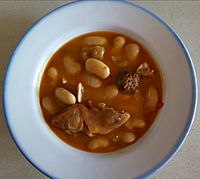Judías de El Barco de Ávila facts for kids

Beans of El Barco de Ávila
|
|
| Course | beans |
|---|---|
| Place of origin | Spain |
| Region or state | Castile and León |
| Serving temperature | hot |
| Main ingredients | beans, pig ears, chorizo, Pig's trotters |
Judías de El Barco de Ávila are special beans grown in a specific part of Spain. They have a "protected geographic designation." This means they are famous for coming from this area and have a special quality because of where they are grown. This special status was given to them on January 5, 1989.
Contents
What Are Barco de Ávila Beans?
Barco de Ávila beans are also known as "Barco beans" or "Judiones from El Barco." They are dried beans that are usually white and quite large. These beans are grown in the fields of El Barco de Ávila, which is in the southwest part of the Province of Ávila in Spain.
Because of their large size, about forty beans make up 100 grams, which is roughly one serving for a person. When cooked, these beans become a traditional Spanish dish. They are often prepared with ingredients like chorizo, blood sausage (called morcilla), bacon, or pig ears.
Where Are These Beans Grown?
The special area where Judías de El Barco de Ávila are grown includes the farmlands in the Barco-Piedrahíta region. These beans are planted on terraces in the valleys. Growing them this way helps protect them from strong winds.
When these beans are sold, they are sorted into two main types: "first" and "extra." This helps people know the quality of the beans they are buying.
Tips for Cooking Barco de Ávila Beans
Here are some helpful tips for preparing these delicious beans:
- Store your beans in a cool and dry place. The temperature should be less than 12 degrees Celsius (about 54 degrees Fahrenheit).
- Before you cook them, soak the beans in cold water for 12 hours. Use about three times as much water as beans.
- If the water in your area is very hard or alkaline, especially near the coast, it's best to use bottled mineral water for both soaking and cooking.
- Beans grow bigger when they cook, so make sure your cooking pot has plenty of extra room.
- Do not add salt to the beans until they are almost fully cooked. Adding salt too early can make them tough.
- While cooking, avoid stirring the beans with a spoon. Instead, gently shake the pot. This helps keep the beans whole and prevents them from breaking apart.
- Cook the beans for about 90 to 120 minutes until they are tender.
- Bean stews often taste even better if you let them rest for a few hours before eating them.
See also
 In Spanish: Judías de El Barco de Ávila para niños
In Spanish: Judías de El Barco de Ávila para niños
 | Tommie Smith |
 | Simone Manuel |
 | Shani Davis |
 | Simone Biles |
 | Alice Coachman |

